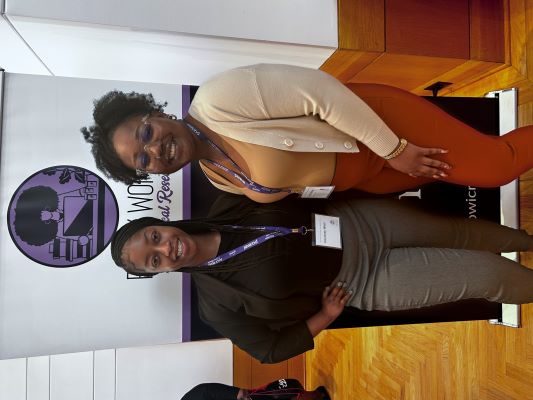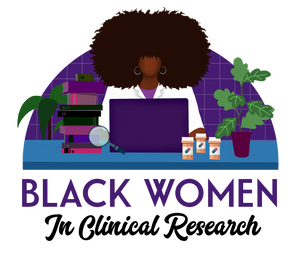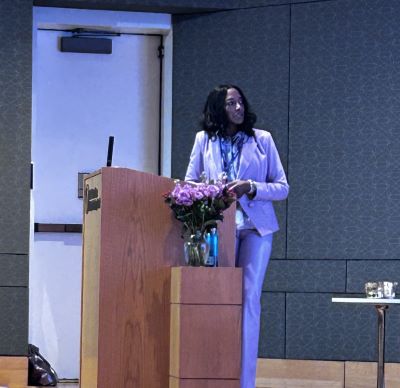
Conference Focuses on Need for Diversity in Clinical Research, Trials
More than 250 women recently gathered in Research Triangle Park for the inaugural Women in Research Conference hosted by Black Women in Clinical Research (BWiCR). During the event, attendees learned about the dangers of clinical trials that lack equitable representation and what they can do to expand diversity in the research field.
BWiCR CEO and Founder Danielle Mitchell launched the organization in 2019 to grow diversity in the field. The event was held at the conference center at the North Carolina Biotechnology Center in Research Triangle Park.

advice and mentorship. -Photo by Mindy Hamlin
“We recognize the crucial importance of having representation in research that reflects the real-world diversity of the patients who benefit from medical advancements,” Mitchell said. “Our mission is to bridge this gap, ensuring that black women and other underrepresented groups are not just participants in clinical trials but are also actively contributing to the research process. We want to break down barriers and biases to create a more equitable and inclusive clinical research community."
Equity in clinical research is critical to the development of drugs and treatments that work for everyone, said Jayne Morgan, the event’s keynote speaker and director of health and community education at Piedmont, a state-wide healthcare system in Georgia.
Ninety-four percent of clinical researchers are men, said Morgan, leading to the development of drugs and medical devices that have not been tested on a diverse patient population.
She pointed to the pulse oximeter as an example. The oximeter, which reads a patient’s oxygen levels, was developed in 1974. The designers of the device did not test it on a diverse set of patients. As a result, research has shown that black patients were three times more likely than white patients to have low oxygen levels that were missed by pulse oximeters.
“Black patients and other people of color can receive inappropriate care, delay medical care, triaged to ER waiting rooms, and receive lower levels of care and concern if low oxygen levels are missed because of inaccurate pulse oximeter readings,” she said. “Because the early designers did not use a diverse group of test subjects, sources of error, like skin tone, were not recognized.”

For Jerome Adams, former U.S. Surgeon General and a distinguished professor and director of health equity initiatives at Purdue University, the need for equitable representation in clinical research and trials is simple.
“If you are not at the table, you are on the menu,” he told the audience.
He argued that having a place at the table is critical to correct misinformation often spread on social media.
Identifying and showing up for opportunities to increase equity is one reason Mitchell founded BWiCR. After attending a clinical investigator meeting where she was only one of two black women in attendance, she realized that the clinical research field was not representative of patients.

including diverse populations in clinical research
and trials. -Photo by Mindy Hamlin
“This profound lack of representation served as a powerful catalyst for me,” Mitchell pointed out. “It highlighted the urgent need for greater diversity and inclusion within the clinical research field. I felt compelled to take action, and that's why I started BWICR – to create opportunities, support, and a stronger voice for black women in clinical research."
Adams encouraged BWiCR members to build awareness, take action, and advocate for equity in clinical trials by pointing out disparities and talking to regulators and educators about its importance.
“We are at a critical moment where people are paying attention to this,” Adams said. “Health equity is about making better drugs for everyone.”
Support and Membership for Women in Clinical Research
In addition to educating members about how to be advocates for clinical research that includes diverse clinical trial participants, BWiCR also provides professional support.
“We're dedicated to supporting members’ professional growth by offering a range of valuable services, including resume reviews, interview preparation, mock interviews, career coaching, and LinkedIn summaries,” Mitchell pointed out. “Our goal is to equip you with the skills, resources, and a network that will help you excel in this field.”
Teryka Satcher and Courtney West traveled from Nashville to attend the conference. At 27 years old, they are both in the early stages of their careers at Syneos. BWiCR has been an important resource for them. Meetups, such as Zoom Wine Down, give them an opportunity to get feedback and support from other women in the field.
“I don’t see a lot of women who look like me,” said West. “BWiCR provides us tips on how to talk with people without feeling timid. I feel much more confident as a result.”
For more information, visit bwicr.com.
